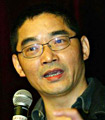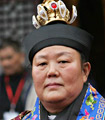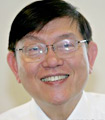| Su Nets Man Prize
 |
|
(CFP) |
Su Tong, one of China's best-selling writers, won this year's Man Asian Literary Prize in Hong Kong on November 16 for his latest work The Boat to Redemption.
The three-member international jury for the prize said that The Boat to Redemption, which depicts the life of a man between 1966 and 1976, was "a picaresque novel of immense charm." Su said in an interview with China Daily it was just a novel "centering on the fate of people caught in an absurd time."
The $10,000 Man Asian Literary Prize is an annual literary award for an "Asian novel unpublished in English." Su is the second Chinese to receive the honor, after Jiang Rong won the inaugural prize in 2007 for Wolf Totem.
Su, 46, began his literary career in 1987 and has published six novels. He is well-known as the author of Wives and Concubines, a novella written in 1989 that was later adapted into Oscar-nominated film Raise the Red Lantern by director Zhang Yimou.
The Boat to Redemption is scheduled to hit the bookshelves in the UK next January, says a report in The Guardian newspaper.
Female Taoist Principal
 |
|
(CFP) | Wu Chengzhen became the first ever principal Taoist abbess on November 15, after she was installed as fangzhang of the Changchun Temple in Wuhan, capital of central China's Hubei Province.
Taoism is China's only indigenous religion, with a history of more than 1,800 years. Fangzhang is the highest-ranking position in a Taoist temple.
Wu, born in January 1957, was formally initiated into Taoism at the Changchun Temple in March 1984. She was elected head of the temple by all its resident Taoists in May.
A graduate from Huazhong University of Science and Technology with a Master's degree in philosophy, Wu also serves as chairwoman of the Hubei Provincial Taoist Association and the Wuhan Municipal Taoist Association. She is also a standing member of the Hubei Provincial Committee of the Chinese People's Political Consultative Conference, the local advisory body.
Chipmaker Steps Down
 |
|
(CFP) |
Richard R. Chang resigned as chief executive of the Semiconductor Manufacturing International Corp. (SMIC), the Chinese mainland's largest contract chipmaker, on November 10 with immediate effect to "pursue other personal interests."
Reports are circulating that Chang was forced to quit by major stakeholders, because he failed to head a turnaround for the cash-strapped SMIC, whose share price has dropped steadily since its initial public offer in 2004.
Hours before Chang's resignation, SMIC agreed to pay $200 million and gave the right to purchase up to 10 percent in the company to Taiwan Semiconductor Manufacturing Co., a world leader in the industry, to settle lawsuits over patent and trade secrets infringement.
Chang, 61, was born on the Chinese mainland but moved to Taiwan with his family in 1949. He had worked for 20 years at Texas Instruments Inc. and served as president of Taiwan's Worldwide Semiconductor Corp. from 1998 to 1999 before founding the SMIC in Shanghai in 2000.
SMIC has appointed David N.K. Wang to replace Chang.
"We must be committed to our promises, strongly oppose trade protectionism in all its manifestations, be vigilant against and correct the 'invisible' protectionism acts in various forms, reduce and eliminate trade barriers, and solve trade disputes through dialogue and coordination, thus creating favorable conditions of the full recovery and long-term development of world economy."
Chinese President Hu Jintao, at the 17th Asia-Pacific Economic Cooperation Leaders' Meeting in Singapore on November 14
"The desire on the part of Chinese authorities to maintain a relatively stable anchor is a very important aspect of China's own stability in this post-crisis climate. The world should turn its attention elsewhere and let China really figure out the right currency policy for its sustainable growth."
Stephen Roach, Morgan Stanley Asia Chairman
"Every six seconds a child dies of hunger. This enormous tragedy is not only a moral outrage and an economic absurdity, but also it presents a serious threat to our collective peace and security."
Jacques Diouf, Director General of the UN Food and Agriculture Organization
"The nation's prestige and prosperity cannot be upheld forever by the achievements of the past."
Russian President Dmitry Medvedev, underlining the importance of sweeping reforms for Russia to become a modern world power in a state-of-the-union address on November 12
"We found water. And we didn't find just a little bit. We found a significant amount."
Anthony Colaprete, lead scientist for NASA's moon punch mission on October 9 from which scientists concluded there is plenty of water on the moon—at least near the lunar south pole. The discovery was announced on November 13 | 